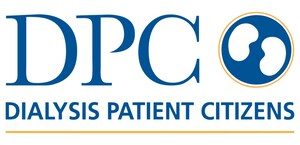Dialysis Patient Citizens' Patient Advocates Storm Capitol Hill
Participants met with Members of Congress to Discuss Extending Immunosuppressive Drug Coverage for Transplant Patients, Deficit Reduction Efforts
WASHINGTON, Sept. 19, 2011 /PRNewswire-USNewswire/ -- Last week, patient advocates with Dialysis Patient Citizens (DPC) traveled to Washington, D.C. to meet with their Members of Congress and discuss legislative issues important to the 31 million Americans with chronic kidney disease. Participants from 21 states came to the nation's capital for a multi-day trip that included a congressional briefing, training session and culminated in a day of meetings on Capitol Hill.
DPC, the nation's largest patient-led dialysis organization, organized the event in an effort to raise awareness with Members of Congress about the unique needs of end stage renal disease (ESRD) patients. Participants on the trip included the DPC Board of Directors and patient volunteers, known as Patient Ambassadors, who devote their time to advocating for kidney issues on the local, state and federal levels year-round.
"It was an honor to participate in the DPC Washington, D.C. Fly-In event last week," said Nancy Scott, DPC Board President. "It is humbling to come to Washington to represent the millions of Americans who are affected by kidney disease and to share my story with my representatives here in Washington."
On Thursday, each participant met with their U.S. Senators and Representative to discuss several policy priorities for the kidney disease community. DPC members asked their representatives to support the Comprehensive Immunosuppressive Drug Coverage for Kidney Transplant Patients Act of 2011, cost-effective, common-sense legislation that will improve the lives of countless kidney transplant patients while using our limited federal resources more effectively. The bill would extend Medicare coverage of immunosuppressive drugs beyond the current 36 month cap, which would help patients secure the medications they need to prevent the early rejection of their transplants and reduce the number of beneficiaries who return to Medicare-funded dialysis after organ rejection.
"The Comprehensive Immunosuppressive Drug Coverage for Kidney Transplant Patients Act is important legislation that will extend immunosuppressive coverage beyond the current 36 month limit, decreasing the risk of graft rejection," said Congressman Michael C. Burgess, M.D. who is the Vice Chair of the House Energy and Commerce Committee's Subcommittee on Health and Chairman of the Congressional Health Care Caucus. "There are 31 million Americans with chronic kidney disease and this legislation will help ensure that transplant recipients continue to receive this vital anti-rejection therapy."
The participants also went to their Capitol Hill meetings armed with ways in which the federal government can enact cost-saving measures to improve our nation's fiscal state of affairs and help avoid potential across-the-board cuts to Medicare. By maintaining access to private coverage for ESRD patients in the new health insurance exchanges and ensuring access to subsidies in the new system, DPC advocates highlighted $4-5 billion in potential Medicare savings over the next decade. Such common-sense measures will improve patient access and help with the long-term fiscal outlook of the county, without harming the sustainability of the Medicare ESRD program.
As part of the week-long event, DPC advocates also joined representatives from the National Kidney Foundation and Baxter to host a congressional briefing called "Dialysis 101." The event, held in conjunction with the Congressional Kidney Caucus, featured a presentation on the basics of kidney disease and dialysis followed by a patient panel. The three-member panel shared their personal stories with kidney failure and highlighted several key topics of importance to the greater kidney community.
PRESS CONTACT:
Jessica Nagro
202-789-6931
SOURCE Dialysis Patient Citizens
WANT YOUR COMPANY'S NEWS FEATURED ON PRNEWSWIRE.COM?
Newsrooms &
Influencers
Digital Media
Outlets
Journalists
Opted In





Share this article